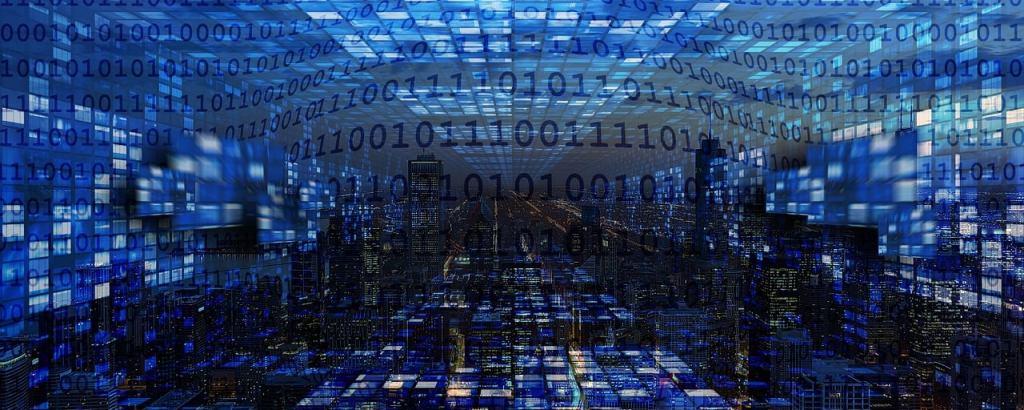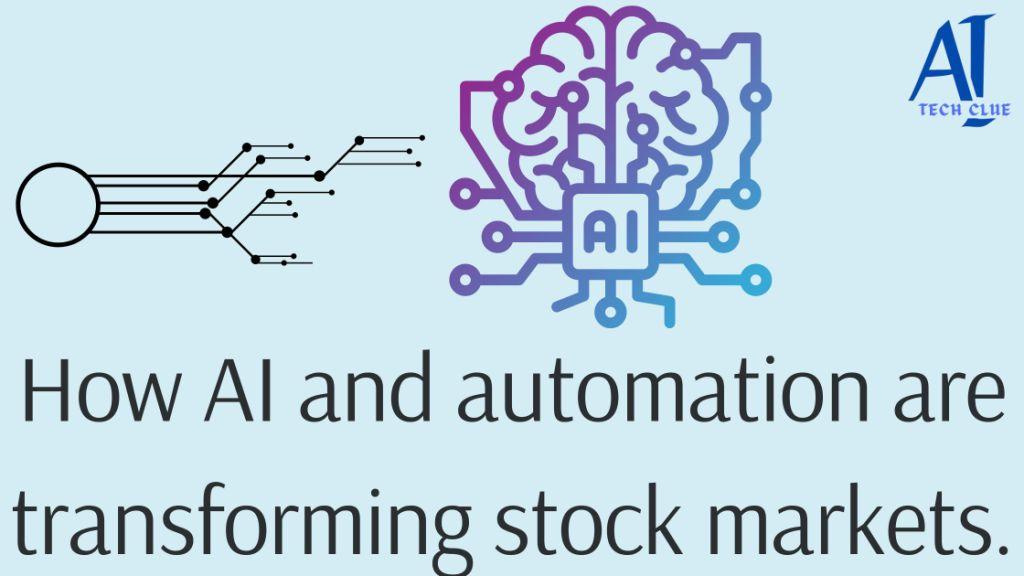Introduction
In recent years, artificial intelligence (AI) and automation have completely reshaped industries across the globe, and the stock market is no exception. AI’s rise is revolutionizing how trades are executed, how risk is managed, and how investors can make decisions. Automation has enhanced speed and efficiency, leading to a new era of market participation. But why is this transformation significant, and how exactly is it unfolding?
If you want to read same article in hindi click here
The Evolution of Stock Markets
Before AI, stock markets relied heavily on manual processes. Investors and brokers had to place orders over the phone, track prices through newspaper listings, and base decisions on limited, often outdated information. The arrival of computers and the internet in the late 20th century introduced basic software systems for placing trades, but the process was still far from what we see today.
The digital revolution changed the game, making it easier for people to access the market. However, the biggest transformation began when AI and automation technologies entered the scene.
What is AI in the Stock Market?
AI in the stock market refers to the use of machine learning algorithms and advanced computing to analyze market data, detect patterns, and make trading decisions. Instead of relying solely on human intuition and experience, AI can process vast amounts of data in seconds, spotting trends and making predictions that a human might miss.
Examples of AI Applications in Trading
- Robo-advisors: Platforms that use algorithms to manage investments based on user preferences.
- Predictive analytics: AI models that predict future stock prices based on historical data and market conditions.
The Role of Automation in Stock Trading
Automation, on the other hand, refers to the use of software that automatically executes trades without the need for human intervention. While AI helps make better decisions, automation ensures that these decisions are implemented at lightning speed.
How Automation Differs from AI
AI focuses on “thinking,” analyzing data and making decisions, while automation is all about “doing,” executing trades based on pre-set rules or instructions. Both work together to optimize trading.
Algorithmic Trading: The New Standard
Algorithmic trading, or algo-trading, is one of the most popular forms of automation in stock markets today. This process involves using complex algorithms to automatically execute trades based on a defined set of criteria, such as price, volume, or market conditions.
How It Works
An algorithm is created to follow certain rules—buy or sell when a stock hits a certain price or execute trades based on specific market conditions. These algorithms can process hundreds of trades in milliseconds, far faster than any human could.
AI in Predictive Analytics for Stock Markets

AI excels in predictive analytics, which is particularly useful in stock market trading. By analyzing large datasets, including historical price movements, economic indicators, and even social media sentiment, AI can forecast future market trends with remarkable accuracy.
AI Models Used for Stock Market Forecasting
- Regression analysis: Helps predict stock prices based on past trends.
- Neural networks: Mimic human brain functions to detect complex patterns in the market.
High-Frequency Trading (HFT)
High-frequency trading is a form of algorithmic trading that relies on AI to make trades at extremely high speeds. In HFT, thousands of orders can be placed in mere fractions of a second, giving firms a competitive edge by exploiting tiny price differences in the market.
Benefits and Drawbacks of HFT
While HFT can improve liquidity and reduce bid-ask spreads, it has also been blamed for causing market volatility and contributing to “flash crashes.”
Benefits of AI and Automation in Stock Trading
The advantages of AI and automation in stock trading are significant:
Increased Speed and Efficiency
AI-powered algorithms can execute trades in microseconds, allowing traders to capitalize on even the smallest market fluctuations.
Enhanced Accuracy and Risk Management
AI minimizes the risk of human error by basing decisions on data rather than emotions or biases. It also helps manage risks by analyzing potential outcomes and suggesting adjustments.
Democratization of Financial Markets
Thanks to AI-powered platforms like robo-advisors, even retail investors with little knowledge of the stock market can now invest intelligently.
AI-Driven Risk Management
Managing financial risks is crucial in stock trading. AI helps investors and institutions manage risks by analyzing market conditions and portfolio performance in real-time.
AI Tools for Portfolio Management
AI-powered tools offer features like real-time risk assessment, portfolio optimization, and automated rebalancing.
Sentiment Analysis and AI
Sentiment analysis is a technique used by AI to gauge the overall mood of the market by analyzing news, social media, and other online sources. AI can process this unstructured data and assess how public sentiment might affect stock prices.
Real-World Examples of Sentiment Analysis
AI tools monitor platforms like Twitter and news websites to predict how investor sentiment will impact stock prices. Companies like HedgeChatter use AI to monitor sentiment and forecast stock trends.
The Dark Side of AI and Automation in Stock Markets
While AI and automation have brought many benefits to stock trading, they also pose risks. The complexity of AI-driven systems can lead to unintended consequences, such as market manipulation or technical glitches.
Flash Crashes Caused by Algorithmic Trading
Flash crashes occur when automated trading systems trigger a rapid sell-off in the market. In 2010, a flash crash wiped out almost $1 trillion in market value in just minutes, largely due to algorithmic trading.
Ethical Concerns and Regulatory Challenges
The rise of AI in the stock market has raised questions about fairness and transparency. Regulators are working to ensure that these systems do not create an unfair advantage or lead to unethical practices.
Market Manipulation and AI
AI can potentially be misused to manipulate stock prices by exploiting vulnerabilities in the market. Some traders use algorithms to engage in tactics like “spoofing,” where they place fake orders to deceive other traders.
The Future of AI and Automation in Stock Markets
As AI continues to evolve, it will likely play an even bigger role in stock markets. From smarter predictive models to more advanced risk management tools, the future looks promising for those who can adapt to this technology.
Predictions for AI’s Role in the Future
AI will continue to revolutionize how traders analyze data, manage risks, and execute trades. It may even lead to fully autonomous trading systems.
How Retail Investors Can Benefit from AI
Retail investors are not left out of this transformation. With tools like AI-powered robo-advisors and stock-picking apps, anyone can leverage the power of AI to make better investment decisions.
AI Apps and Platforms for Beginners
Platforms like Betterment, Wealthfront, and Robinhood use AI to help beginners manage
their portfolios and make informed investment choices.
Conclusion
AI and automation are fundamentally changing how stock markets operate. From faster trades to smarter risk management, the advantages are clear. However, with these advancements come new challenges, including the potential for market manipulation and the need for regulatory oversight. The future of AI in the stock market looks bright, but investors must stay informed and adapt to these changes to succeed.
How to Invest in 5G Technology Companies
FAQs
- What are the benefits of AI in stock trading?
- AI enhances speed, accuracy, and risk management, making trading more efficient.
- Can AI predict stock market crashes?
- While AI can analyze data for potential warning signs, predicting market crashes with certainty is still difficult.
- Is AI making human traders obsolete?
- Not entirely. Human traders still play a vital role, especially in decision-making that requires emotional intelligence and context.
- What tools are available for retail investors to use AI?
- Tools like robo-advisors, stock-picking apps, and AI-driven analytics platforms are widely available for retail investors.
- Are there any risks associated with AI in stock trading?
- Yes, including market manipulation, flash crashes, and ethical concerns over transparency and fairness.


1 thought on “How AI and Automation Are Transforming Stock Markets”